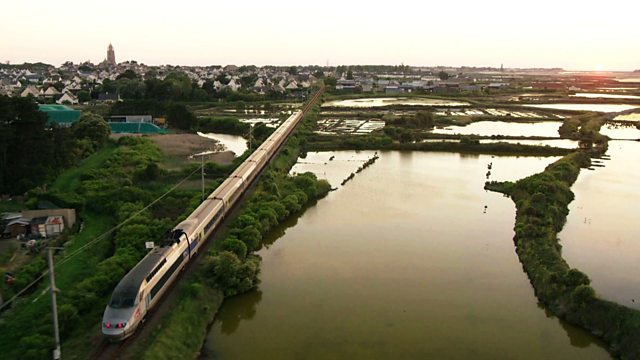
Sar-Threanaichean/Mega Trains
The continuous push for even higher speeds on the French railways. An iomairt choitcheann airson a dhol nas luaithe air rathaidean iarainn na Frainge.
For the second time, the TGV, France’s high-speed train, is the fastest train in the world. Yet, its engineers are continuously pushing for even higher speeds, having launched the new TGV Ocean and the AGV, the TGV of the future.
It all began back in the 1950s with the CC 7100 series and its electric locomotive, which was considerably lighter than any of its predecessors. This technological gem made history by breaking the world’s speed record for trains. As the electrification of rail traffic proved to be a success, more and more of the less powered steam locomotives were phased out.
Since then, the successors of the original TGV have smashed all records for rail-bound traffic, culminating in 2007 with an incredible performance of 574 kilometres per hour.
Airson an dàrna turas, 's e an TGV, deann-thrèana na Frainge, an trèana as luaithe air thalamh. Ach tha na h-einnseanairean daonnan ag iomairt airson a dhol nas luaithe buileach, is iad air an TGV Ocean ùr agus an AGV – an TGV airson an àm ri teachd – a chur air bhog.
Thòisich an iomairt sna 1950an, leis an t-sreath CC 7100 's a charbad dhealain a bha gu math na b' aotruime na gin a chaidh roimhe. Choisinn an ulaidh teicneòlais seo àite ann an eachdraidh le bhith a' briseadh clàr-astair na cruinne airson trèanaichean. Mar a shoirbhich le bhith a' cleachdadh dealan airson còmhdhail rèile, chaidh barrachd dhe na trèanaichean-smùide nach robh cho cumhachdach a-mach à bith.
Bhon uairsin, tha sliochd a' chiad TGV air suids a chur ris gach clàr airson siubhal air rèile, mu dheireadh thall a ruighinn astar 574 cilemeatair san uair ann an 2007.
Dubbed in Gaelic with English subtitles
Last on
Broadcasts
- Thu 5 Aug 2021 22:30
- Sat 7 Aug 2021 22:00
- Thu 20 Oct 2022 22:50
- Sat 22 Oct 2022 22:05
